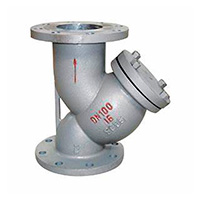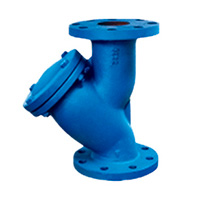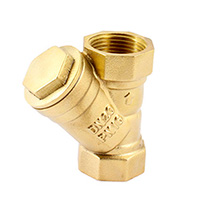Filters
Description of Section "Filters"
Filters for pipeline systems are devices designed to clean working media (liquids or gases) from mechanical impurities and other contaminants. They play an important role in protecting equipment such as pumps, compressors, heat exchangers, and shut-off valves from damage and blockages.
Main Types of Filters
1. Mesh Filters
Mesh filters are the most common type of filters in pipeline systems. They are used for coarse cleaning of the medium from large mechanical impurities (sand, rust, scale). The main element of such filters is a metal mesh with cells of a specific size.
- Types of mesh filters by design:
- Y-type: Compact devices with a Y-shaped housing. Installed horizontally or vertically.
- Basket-type (T-type): Have a large capacity for collecting contaminants due to a vertical basket. Used when minimal pressure drop is required.
- Duplex basket-type: Consist of two parallel basket filters, allowing maintenance of one without stopping the system.
- Housing and mesh materials: Cast iron, stainless steel, brass. The choice of material depends on the working medium and operating conditions.
2. Magnetic Filters
Magnetic filters are designed to capture metal particles (e.g., rust) from the working medium using a magnetic field. They are often used in water supply systems before water meters or pumps.
- The design includes a magnetized rod and a metal mesh.
- Used to protect equipment from iron-containing impurities.
3. Sediment (Gravity) Filters
These devices work by separating impurities under the influence of gravity. Impurities settle in a special compartment — a sediment trap.
- Effective only for low-viscosity liquids.
- Primarily used for preliminary water purification.
4. Centrifugal Filters (Centrifuges)
Centrifugal filters separate impurities by rotating the working medium inside the device. Particles settle on the walls under the influence of centrifugal force.
- Provide a high degree of purification.
- Require significant energy consumption.
Operating Principle
The principle of operation of most pipeline filters is based on trapping solid particles as the working medium passes through a porous material (mesh or perforated plate). The size of the mesh cells determines the degree of purification:
- Large particles are trapped on the surface of the mesh.
- Contaminants are collected in a special compartment (sediment trap).
- Depending on the type of filter, manual or automatic cleaning is performed.
Applications
Filters are widely used in the following systems:
- Water supply (hot and cold water): For removing sand, rust, and other mechanical impurities.
- Heating: Protection of heat exchangers from blockages.
- Gas systems: Removal of dust and solid particles from gas.
- Petroleum products: Purification of oils from suspended particles.
Advantages of Using Pipeline Filters
- Extending the service life of equipment by protecting it from contaminants.
- Reducing repair costs for pipeline valves.
- Easy installation and maintenance of most models.
- Ability to operate in a wide range of temperatures and pressures.


